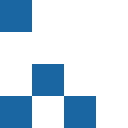Shape children for a lifetime of success with an Early Childhood Education degree from St. Ambrose University. Our Education program prepares you to teach children of all abilities. You’ll learn to foster a child’s natural curiosity. Discover the art of childhood development with a BA in Early Childhood Education.
What is an Early Childhood Education degree?
Reduce tuition by up to $24k
Why earn a BA in Early Childhood Education?
We offer future teachers a place to put theory into practice. In our classrooms, you’ll learn the skills to support students’ social-emotional and developmental needs alongside the academic skills and concepts required to run a classroom or childcare facility. Then, you’ll go into classrooms and put what you learned into practice.
Hands-on learning
Learn by doing: 200+ hours of field experience and a semester of student teaching await at SAU.
Special education endorsement
Prioritize early intervention with our special education endorsement in ECE curriculum.
Path to licensure
Complete our ECE program and get recommended for a license to teach in Iowa agencies and schools.
Iowa and beyond
Whether you want to work in Illinois or another state, our faculty will guide you through the application process.
Experience at multiple age levels
During your student teaching, teach at two of the following levels: 0-3 years, 3-6 years, and kindergarten-third grade.
Supportive environment
Our faculty and students create a supportive learning environment, cultivating creativity, innovation, and a sense of community.
What you’ll learn in your Early Childhood Education program
You’ll start by taking foundational courses in education. Then, you’ll delve into courses with a focus on early childhood and special education. You’ll learn the history, theory, and latest research underpinning early childhood education with a focus on content knowledge, teaching methods, and current issues in education. When you complete your degree, you’ll be prepared to become a fully licensed teacher in the State of Iowa.
- Understanding of child growth and development from infancy to primary school.
- Expertise in creating inclusive curriculum for diverse young children
- Ability to create strategies for helping young children understand math, science, and social studies concepts
- Expertise in teaching reading and literacy skills to young children
- Skills in trauma-informed, play-based teaching, including supporting young children’s behavior.
Explore Early Childhood Education courses
- This degree will require you to complete a total of 120-130 credits.
- You will complete 33 gen ed credits and 97-99 credits in Early Childhood Education.
- You will also complete 215 hours of pre-student teaching field experiences at two different age levels, and 1 semester of student teaching.
Sample courses
| Class code | Class title | Credits |
|---|---|---|
| ECE 303 | Literacy for Young Children | 3 credits |
| ECE 307 | Science for Young Children | 3 credits |
| ECE 365 | Early Childhood Development | 3 credits |
| ECSE 321 | Managing Young Children’s Behavior | 3 credits |
| ECSE 410 | Infant and Toddler Development and Curriculum | 3 credits |
How much does a BA in Early Childhood Education cost?
The cost of your degree will depend on several factors, like scholarships, housing, meal plans, and transfer credits. New students also pay a $100 matriculation fee. You will also need to budget for books, supplies, materials, transportation, personal costs, loan fees, and other expenses. Explore the cost of attendance.
Full-time student living on campus
| Expense | By semester | By year |
|---|---|---|
| Full-time tuition (12-18 credits)* | $19,674 | $39,348 |
| Housing** | $4,313 | $8,625 |
| Food*** | $3,135 | $6,270 |
| Technology fee | $150 | $300 |
| Total direct charges (billable) | $27,272 | $54,543 |
*Based on 2026-2027 tuition and fees. Tuition and fees are subject to change each summer.
**This cost is estimated, actual housing cost will vary by student selections.
***Cost estimate based on 3 meals per day.
How much does campus housing cost?
When it comes to housing, St. Ambrose University offers diverse options to meet the needs of our students. From traditional dormitories to apartment-style living, there’s something for everyone. The cost of our housing will vary based on where you decide to live and the meal plan you choose.
St. Ambrose University is accredited by the Higher Learning Commission
Accreditation and recognition provide the assurance we meet standards for quality faculty, curriculum, leaner services, and fiscal stability.
St. Ambrose University’s Early Childhood Education program is approved by the Iowa Department of Education.
How does SAU support Early Childhood Education students?
St. Ambrose University’s Education faculty have a wide range of expertise in early childhood, elementary, and special education settings including administrative experience at a district level. You’ll learn from professors who care about your success and are ready to help you become an employable sought-after teacher.
Early childhood education faculty
Other support resources
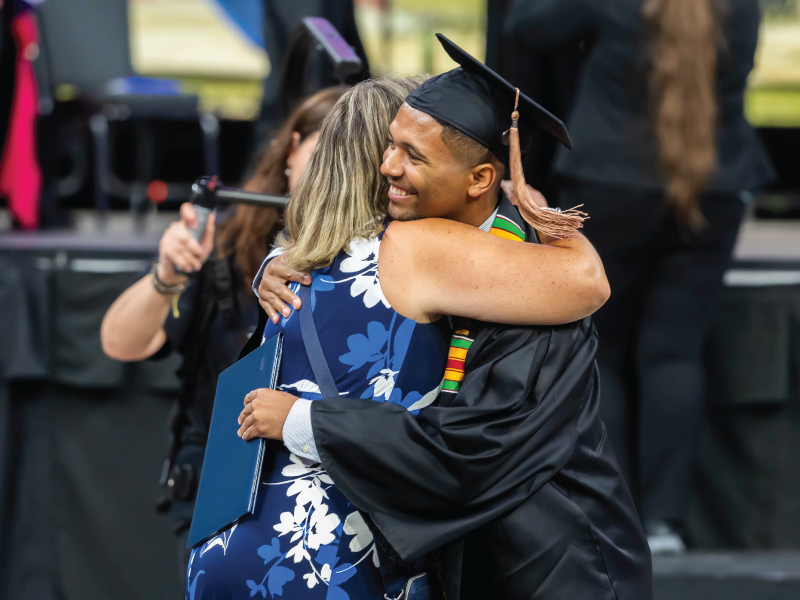
Student Success Center
At St. Ambrose, we want you to thrive. Access free tutoring, study groups, and supplemental instruction through our Student Success Center.
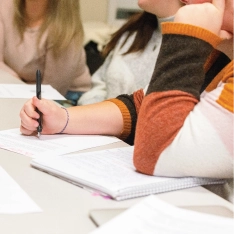
Accessibility Resource Center
Whether you need classroom accommodations, alternative exam arrangements, or disability support strategies, our Accessibility Resource Center is here to help.
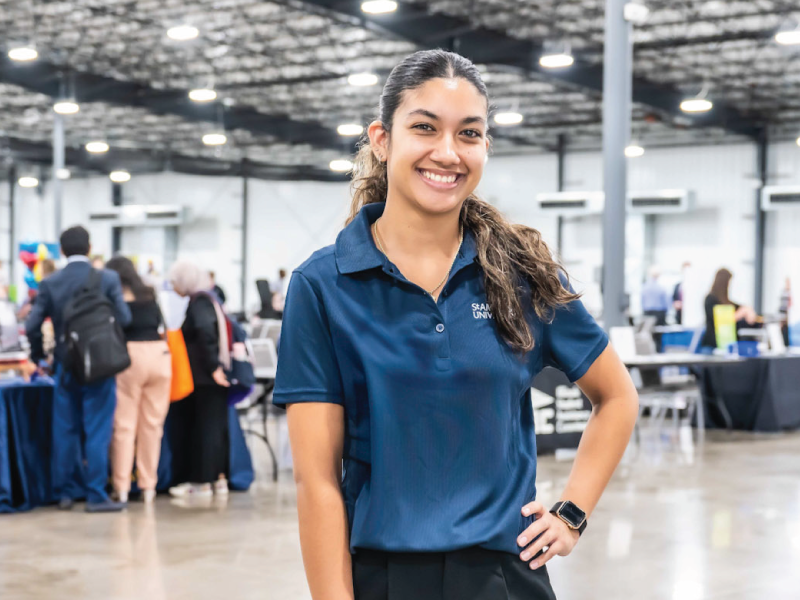
Career services
Our Academic and Career Planning Center is ready to help you polish your resume and land the job or internship that will launch your career.
Are there scholarships available for BA in Early Childhood Education?
At St. Ambrose University, we believe that education should be accessible to all. That's why we offer a variety of scholarships and financial aid options to help make college more affordable for our students. We are committed to providing our students with the resources they need to succeed academically and financially.
Ambrose Advantage Scholarship
Through the Ambrose Advantage Scholarship program, a tuition-free St. Ambrose University education is available to any Pell Grant-eligible Iowans. Learn more about the Ambrose Advantage.
Merit-based and institutional scholarships
St. Ambrose offers excellent scholarships and grants based on your strong academic performance, your talent in fine arts or athletics, or your community involvement. Explore SAU scholarships.
Transfer credits
At SAU, you may be able to transfer previous college credit toward your bachelor’s degree, saving you significant time and money. Learn how to transfer credits.
A bright future. Worry-free.
"I always wanted to go to college but finances were an issue. With the Ambrose Advantage, I don't have to worry. My tuition is paid and I'm getting a good education."
-Alexis Stovall, Davenport, Iowa
What’s on campus for Early Childhood Education students?
Join an international organization of student teachers in student teaching programs–Phi Delta Kappa. Members engage in service projects and participate in regional conferences. Our program is designed to help students get hands-on experience that will boost your resume and make you more marketable to future employers.
Finding passion in education
"When I came here as an undergraduate student, I truly fell in love with what I saw and knew I had to be in this field. I found my niche."
-Andromahi Harrison Garners '20, BA in Early Childhood Education
What are the general admission requirements for a BA in Early Childhood Education?
Ready to become a Bee? Here are the admissions requirements for our Early Childhood Education program.
- You must have graduated from an accredited high school or earned a GED
- You must have a minimum cumulative, unweighted GPA of 2.5
- You must provide an official high school transcript
International student requirements
If you live outside of the U.S. there are different admissions requirements. Here’s what you’ll need:
- Official transcripts from secondary education
- A minimum 2.5 CGPA out of a 4.0 scale, or equivalent
- Proof of English language proficiency (minimum scores: TOEFL - 79, IELTS - 6.0)
- Copy of your passport and other documentation
What are the School of Education admission requirements for a BA in Early Childhood Education?
We have special requirements for admittance to the School of Education’s educator preparation program.
- You must complete 40 field hours in EDUC 205 or provide verification through EDUC 207
- You must provide two professional rating forms (EDUC 205 or 207 instructor, and cooperating teacher's evaluation) which show you earned an average rating of at least Developing (3) in the three separate dispositional categories and recommended by both course instructor and cooperating teacher
- You must receive a grade of "B" or above in EDUC 205 or EDUC 207
- You must complete the application for admission to teacher education program form (including statement of fraud section and necessary signatures)
- You must receive a grade of ‘B’ or above in EDUC 282 and EDUC 284
What can I do with an Early Childhood Education degree?
Your education and degree can help you reach your professional goals. St. Ambrose University can never promise a career or particular outcome upon graduating. We encourage you to explore potential jobs and employment settings. Here is a list of potential job titles, traits, and settings a graduate in our Early Childhood Education program could achieve.
Potential job titles
- Preschool teacher
- Kindergarten teacher
- Elementary school teacher
- Special education
- Childcare center director
- Early childhood education consultant
Potential employment settings
- Preschool
- K-8 Schools
- Education boards
- Child care centers
- School administration
- Counselor
Traits of an early childhood educator
- Patience and empathy
- Creativity
- Communication skills
- Attention to detail
- Flexible and adaptable
- Organizational skills
Industry facts
- The median annual wage for elementary school teachers, except special education, was $63,680 in May 2023.
- The median annual wage for kindergarten teachers, except special education, was $62,690 in May 2023.
For more information on financial employment and wages, visit the Bureau of Labor Statistics' Occupational Outlook Handbook.
News and events at SAU
 >
>
QC World Cultures Festival
International Studies Program and World Affairs Council of the Quad Cities invites you to a vibrant celebration of cultural diversity.
Read more
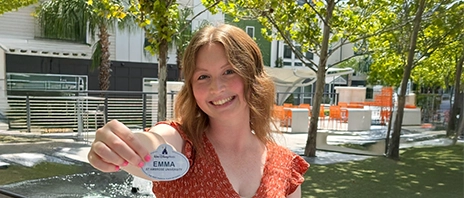
From St. Ambrose to Disney: Alum joins Disney College Program
St. Ambrose University graduate Emma Stiener ‘25 is taking her passions for teaching, dance, and storytelling to “the most magical place on Earth."
Read more

As SAU and MMU Work to Combine, High School Sweethearts Katie and Bob Gaffney Now Share a College Connection
High school brought together Katie and Bob Gaffney, and now their chosen universities have created a new mutual connection.
Read more

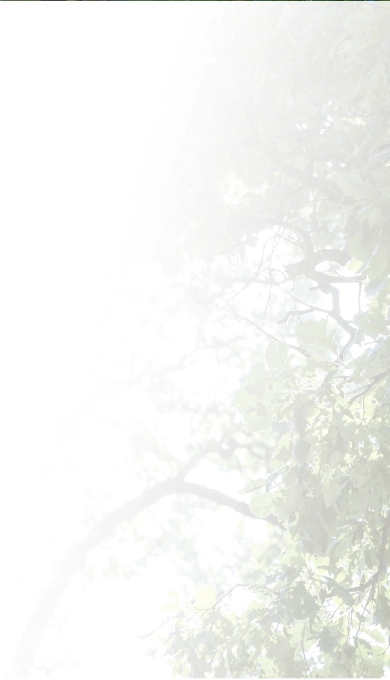
Become who you are meant to be
With more than 50 undergraduate and graduate programs, there’s something for everyone at St. Ambrose University! Explore our programs to find your place at SAU.

